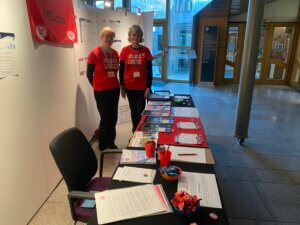In September 2016, Queen Mary University of London (QMUL) was compelled to release the data from the 2011 PACE trial, a trial which examined the effect of graded exercise therapy and cognitive behavioural therapy on people with Myalgic Encephalomyelitis.
West Australian Alem Matthees was one of many people who wanted a closer look at the information from the study.
In March 2014, he filed a UK Freedom of Information Act request for the data, but Queen Mary University of London (QMUL) – the institution that sponsored the PACE study – denied his request. On 18 June 2014, Matthees requested an internal review, but QMUL again denied his request. On 15 Dec., 2014, he filed a complaint to the Information Commissioner (IC). In Oct. 2015, the IC ruled in Matthees’ favour that the researchers were required to release the anonymised data of the study. QMUL appealed but again lost their appeal in Aug. 2016. (source)
QMUL spent 250,000 pounds to try to keep the publicly-funded data from the the public, according to an FOI request.
The information released revealed that ‘recovery’ rates for cognitive behavioural therapy and graded exercise therapy (CBT/GET) are not statistically significant. There are glaring methodological and ethical problems with the study and the authors misrepresented their findings.
Matthees and others wrote a paper on the released data: A preliminary analysis of ‘recovery’ from chronic fatigue syndrome in the PACE trial using individual participant data.
Alem Matthees kindly answered questions for ME Australia:
As an Australian, how did PACE trial results published in the Lancet affect you?
I have not had much contact with health care professionals since the PACE trial results were published, but the PACE trial potentially affects all patients around the world, as the trial is widely promoted as ‘definitive’. As an Australian I have observed the CBT/GET approach slowly taking a foothold without sufficient skepticism applied to the more questionable aspects. I am concerned that our authorities are taking the research at face value, such as assuming that CBT/GET safely increase activity levels, despite the objective evidence actually showing no such increase.
Did you think your Freedom Of Information Act (FOIA) request would be successful?
It was difficult to predict the outcome of the FOIA request. I estimated that the chances were high enough to warrant an attempt but that the outcome depended largely on the judgement of the Information Commissioner’s Office. The more I researched the FOIA legislation the more I concluded that QMUL’s arguments were unsound.
What impact do you think the release of information will have on Australian policies and guidelines for treatment?
It is too early to tell what effect the data release will have on Australian policies and guidelines for treatment when these are still influenced by proponents of CBT/GET. Re-analyses of the data will most likely need to be published in peer reviewed journals before having an impact on Australian policies and guidelines.
What impact do you hope it will have here?
Hopefully, at the very least, there will be a significant downgrading of the claimed effects of CBT and GET. We have re-analysed the PACE trial data using the thresholds established in the published trial protocol and found that neither CBT nor GET significantly increase recovery rates at 52-week follow-up.
Furthermore, the 2.5 year follow-up from the PACE trial (published by the trial investigators) demonstrated no significant difference between groups in general, but this was misleadingly presented as the benefits of CBT and GET are “sustained”.
Evidence from the PACE trial and other trials of CBT/GET for ME/CFS also demonstrate no meaningful improvements to objective outcome measures or activity levels. This reality should be acknowledged by our health authorities.
Has this come at a cost to your health?
Pursuing the FOIA cost me much in time and energy. When combined with other factors such as physical over-exertion and sleep deprivation, it eventually contributed to a severe relapse.
Regarding the Australian studies, I do not have the time or energy to look at them in detail, but I am concerned that some Australian researchers are unaware that evidence points towards CBT/GET not increasing activity levels, or that attempts to increase them beyond our current capacity are harmful, as post-exertional symptomatology is a hallmark of ME/CFS and a result of biologically abnormal responses to exertion.
West Australian Alem Matthees was one of many people who wanted a closer look at the information from the study.
In March 2014, he filed a UK Freedom of Information Act request for the data, but Queen Mary University of London (QMUL) – the institution that sponsored the PACE study – denied his request. On 18 June 2014, Matthees requested an internal review, but QMUL again denied his request. On 15 Dec., 2014, he filed a complaint to the Information Commissioner (IC). In Oct. 2015, the IC ruled in Matthees’ favour that the researchers were required to release the anonymised data of the study. QMUL appealed but again lost their appeal in Aug. 2016. (source)
QMUL spent 250,000 pounds to try to keep the publicly-funded data from the the public, according to an FOI request.
The information released revealed that ‘recovery’ rates for cognitive behavioural therapy and graded exercise therapy (CBT/GET) are not statistically significant. There are glaring methodological and ethical problems with the study and the authors misrepresented their findings.
Matthees and others wrote a paper on the released data: A preliminary analysis of ‘recovery’ from chronic fatigue syndrome in the PACE trial using individual participant data.
Alem Matthees kindly answered questions for ME Australia:
As an Australian, how did PACE trial results published in the Lancet affect you?
I have not had much contact with health care professionals since the PACE trial results were published, but the PACE trial potentially affects all patients around the world, as the trial is widely promoted as ‘definitive’. As an Australian I have observed the CBT/GET approach slowly taking a foothold without sufficient skepticism applied to the more questionable aspects. I am concerned that our authorities are taking the research at face value, such as assuming that CBT/GET safely increase activity levels, despite the objective evidence actually showing no such increase.
Did you think your Freedom Of Information Act (FOIA) request would be successful?
It was difficult to predict the outcome of the FOIA request. I estimated that the chances were high enough to warrant an attempt but that the outcome depended largely on the judgement of the Information Commissioner’s Office. The more I researched the FOIA legislation the more I concluded that QMUL’s arguments were unsound.
What impact do you think the release of information will have on Australian policies and guidelines for treatment?
It is too early to tell what effect the data release will have on Australian policies and guidelines for treatment when these are still influenced by proponents of CBT/GET. Re-analyses of the data will most likely need to be published in peer reviewed journals before having an impact on Australian policies and guidelines.
What impact do you hope it will have here?
Hopefully, at the very least, there will be a significant downgrading of the claimed effects of CBT and GET. We have re-analysed the PACE trial data using the thresholds established in the published trial protocol and found that neither CBT nor GET significantly increase recovery rates at 52-week follow-up.
Furthermore, the 2.5 year follow-up from the PACE trial (published by the trial investigators) demonstrated no significant difference between groups in general, but this was misleadingly presented as the benefits of CBT and GET are “sustained”.
Evidence from the PACE trial and other trials of CBT/GET for ME/CFS also demonstrate no meaningful improvements to objective outcome measures or activity levels. This reality should be acknowledged by our health authorities.
Has this come at a cost to your health?
Pursuing the FOIA cost me much in time and energy. When combined with other factors such as physical over-exertion and sleep deprivation, it eventually contributed to a severe relapse.
Regarding the Australian studies, I do not have the time or energy to look at them in detail, but I am concerned that some Australian researchers are unaware that evidence points towards CBT/GET not increasing activity levels, or that attempts to increase them beyond our current capacity are harmful, as post-exertional symptomatology is a hallmark of ME/CFS and a result of biologically abnormal responses to exertion.
Recommended further reading: How Alem Matthees’ letter helped solve Chronic Fatigue Syndrome mystery by Jason Murphy





